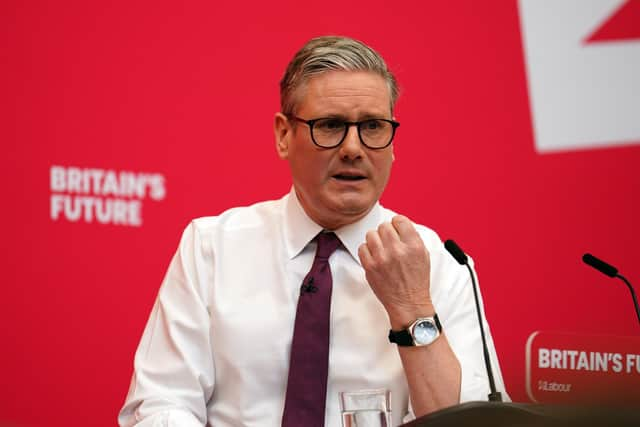Labour plans 'historic' investment in Yorkshire's ports
On a visit to the North East today, the Labour leader is expected to say that its £1.8 billion investment over five years will lead to the most significant upgrade to Britain’s ports in a generation.
The party has previously committed to investing the money in the UK’s port infrastructure as part of its Green Prosperity Plan, and hopes to entice billions more into the UK’s energy industry from the private sector.
Advertisement
Hide AdAdvertisement
Hide AdThe ports in and around the North and East of the Yorkshire and Humber region have seen decline over several decades following the deindustrialisation of many areas of the North, though recent years have seen some success in safeguarding local jobs.


This is in large part due to a focus on green technologies, with wind, hydrogen and carbon capture technologies providing a potential future for the job security of thousands working in the industry across the region.
Ahead of his visit, Sir Keir accused the Conservatives of allowing Britain's industrial strength to be “reduced to the rubble and rust of closed-down factories” by allowing “good jobs to go overseas”.
He told The Yorkshire Post: “Yorkshire can be a clean energy powerhouse for our country and Labour’s Green Prosperity Plan is how we make that happen, unlocking more than 71,000 new jobs across the region.
Advertisement
Hide AdAdvertisement
Hide Ad“By setting up Great British Energy and investing in marine power and green hydrogen, our plans for clean power will put money back in the pockets of people across Yorkshire, saving the average household £300 on their average annual household energy bill by 2030.”
Ed Miliband, the party’s shadow energy secretary, said: "By investing in homegrown clean power in Yorkshire, like green hydrogen and offshore wind, and upgrading thousands of homes through our Warm Homes Plan, we can lower bills for households for good and deliver energy independence for Britain.”
The port infrastructure plan will form a key part of the party’s Green Prosperity Plan, which has been scaled back from its original price tag of £28 billion per year.
The Conservatives have criticised the plans as both unrealistic and unaffordable, meaning it would lead to higher taxes under a Labour government.
Advertisement
Hide AdAdvertisement
Hide AdClaire Coutinho, the Energy Security Secretary, accused Labour of using the announcement to distract from questions about Angela Rayner’s tax affairs.
She added: “And once again they are committing to their unfunded decarbonisation promise, which Labour themselves say costs £28 billion a year, but they have no plan to pay for it.
“Straight from the same old Labour playbook, Ed Miliband’s unfunded spending commitments will take families and businesses back to square one with higher borrowing and higher taxes.”
The Conservatives were yesterday handed a boost to its economic credentials after inflation fell below the US rate for the first time in two years, down to 3.2 per cent in March.
Advertisement
Hide AdAdvertisement
Hide AdHowever, the fall was slightly less than expected last month, leading to City economists and investors trimming their forecasts for interest rate cuts this year.
Simon Pittaway, Senior Economist at the Resolution Foundation, said: “Many economies have struggled through an inflation-driven cost of living crisis over the past two years, but the UK has been an outlier – experiencing a prolonged period of double digit price rises. With UK inflation finally falling below the US, its unwanted outlier status is over.
“With a further significant drop due next month, inflation should soon return to target – and the pressure to cut interest rates will grow.”